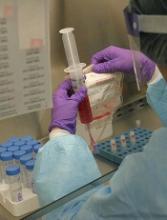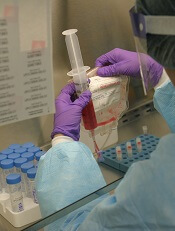User login
The US Food and Drug Administration (FDA) has granted another breakthrough therapy designation to CTL019 (tisagenlecleucel-T), an investigational chimeric antigen receptor (CAR) T-cell therapy.
CTL019 now has breakthrough designation as a treatment for adults with relapsed or refractory diffuse large B-cell lymphoma (DLBCL) who have failed 2 or more prior therapies.
The FDA previously granted CTL019 breakthrough designation as a treatment for relapsed/refractory B-cell acute lymphoblastic leukemia (ALL) in pediatric and young adult patients.
Breakthrough designation is intended to expedite the development and review of new medicines that treat serious or life-threatening conditions, if those medicines have demonstrated substantial improvement over available therapies.
The breakthrough designation for CTL019 in DLBCL is based on data from the phase 2 JULIET trial (NCT02445248), in which researchers are evaluating the efficacy and safety of CTL019 in adults with relapsed/refractory DLBCL.
Findings from JULIET are expected to be presented at an upcoming medical meeting.
About CTL019
CTL019 consists of autologous T cells expressing a CD19-specific CAR. The therapy was first developed by the University of Pennsylvania.
In 2012, the university and Novartis entered into a global collaboration to further research, develop, and commercialize CAR-T cell therapies, including CTL019. Novartis holds the worldwide rights to CARs developed through the collaboration.
According to Novartis, regulatory submissions for CTL019 in the treatment of relapsed/refractory DLBCL are expected to be filed by the end of the year.
The company has already filed a biologics license application with the FDA for CTL019 as a treatment for patients with relapsed/refractory B-cell ALL. The FDA granted that application priority review. ![]()
The US Food and Drug Administration (FDA) has granted another breakthrough therapy designation to CTL019 (tisagenlecleucel-T), an investigational chimeric antigen receptor (CAR) T-cell therapy.
CTL019 now has breakthrough designation as a treatment for adults with relapsed or refractory diffuse large B-cell lymphoma (DLBCL) who have failed 2 or more prior therapies.
The FDA previously granted CTL019 breakthrough designation as a treatment for relapsed/refractory B-cell acute lymphoblastic leukemia (ALL) in pediatric and young adult patients.
Breakthrough designation is intended to expedite the development and review of new medicines that treat serious or life-threatening conditions, if those medicines have demonstrated substantial improvement over available therapies.
The breakthrough designation for CTL019 in DLBCL is based on data from the phase 2 JULIET trial (NCT02445248), in which researchers are evaluating the efficacy and safety of CTL019 in adults with relapsed/refractory DLBCL.
Findings from JULIET are expected to be presented at an upcoming medical meeting.
About CTL019
CTL019 consists of autologous T cells expressing a CD19-specific CAR. The therapy was first developed by the University of Pennsylvania.
In 2012, the university and Novartis entered into a global collaboration to further research, develop, and commercialize CAR-T cell therapies, including CTL019. Novartis holds the worldwide rights to CARs developed through the collaboration.
According to Novartis, regulatory submissions for CTL019 in the treatment of relapsed/refractory DLBCL are expected to be filed by the end of the year.
The company has already filed a biologics license application with the FDA for CTL019 as a treatment for patients with relapsed/refractory B-cell ALL. The FDA granted that application priority review. ![]()
The US Food and Drug Administration (FDA) has granted another breakthrough therapy designation to CTL019 (tisagenlecleucel-T), an investigational chimeric antigen receptor (CAR) T-cell therapy.
CTL019 now has breakthrough designation as a treatment for adults with relapsed or refractory diffuse large B-cell lymphoma (DLBCL) who have failed 2 or more prior therapies.
The FDA previously granted CTL019 breakthrough designation as a treatment for relapsed/refractory B-cell acute lymphoblastic leukemia (ALL) in pediatric and young adult patients.
Breakthrough designation is intended to expedite the development and review of new medicines that treat serious or life-threatening conditions, if those medicines have demonstrated substantial improvement over available therapies.
The breakthrough designation for CTL019 in DLBCL is based on data from the phase 2 JULIET trial (NCT02445248), in which researchers are evaluating the efficacy and safety of CTL019 in adults with relapsed/refractory DLBCL.
Findings from JULIET are expected to be presented at an upcoming medical meeting.
About CTL019
CTL019 consists of autologous T cells expressing a CD19-specific CAR. The therapy was first developed by the University of Pennsylvania.
In 2012, the university and Novartis entered into a global collaboration to further research, develop, and commercialize CAR-T cell therapies, including CTL019. Novartis holds the worldwide rights to CARs developed through the collaboration.
According to Novartis, regulatory submissions for CTL019 in the treatment of relapsed/refractory DLBCL are expected to be filed by the end of the year.
The company has already filed a biologics license application with the FDA for CTL019 as a treatment for patients with relapsed/refractory B-cell ALL. The FDA granted that application priority review. ![]()

